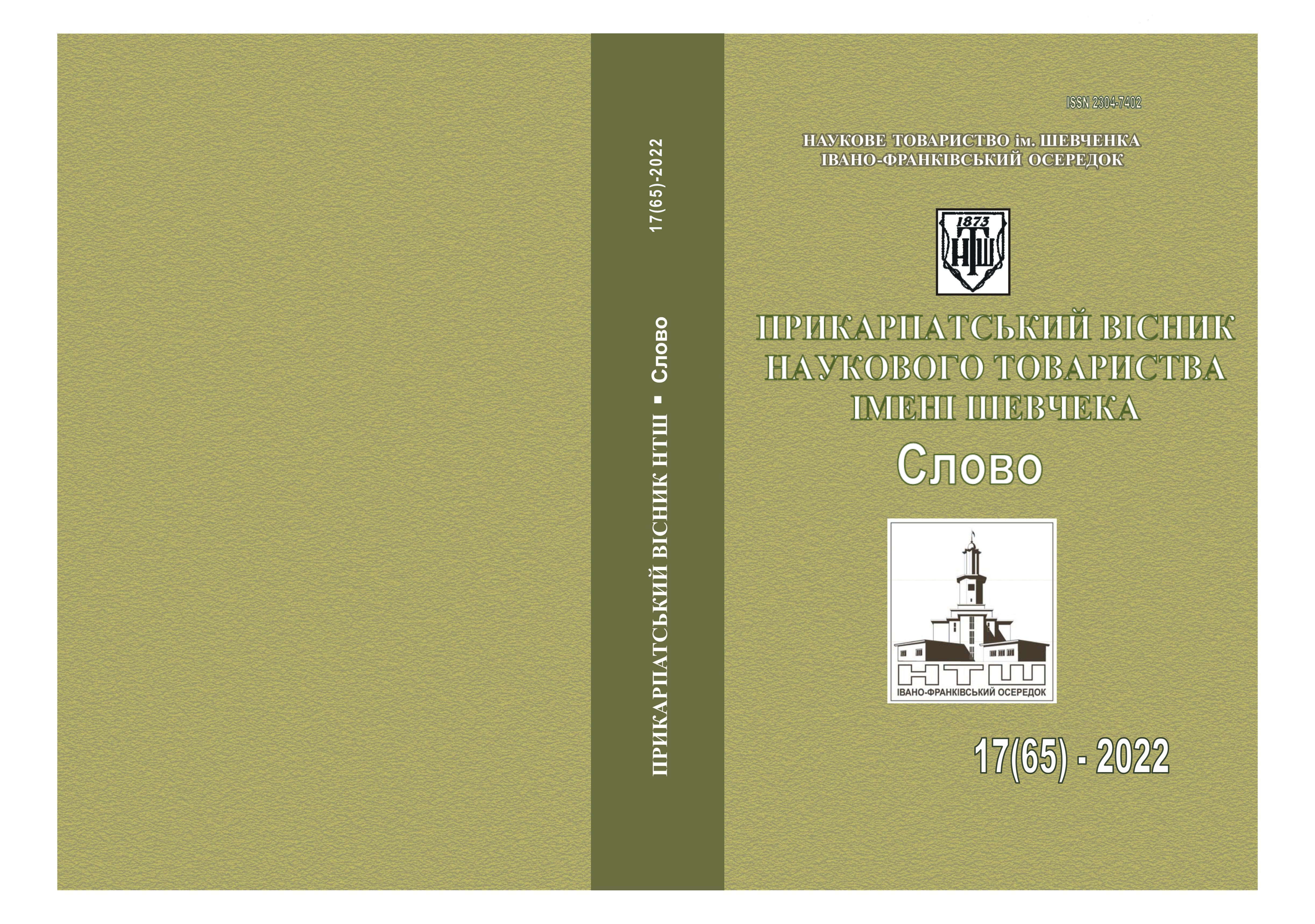DIALOGUE AS A MEANS OF EXPRESSING THE GENESIS OF THE NATIONAL CHARACTER IN THE DRAMATIC WORKS OF THE UKRAINIAN DIASPORA OF THE FIRST HALF OF THE 20TH CENTURY (BASED ON THE WORKS OF VASYL CHAPLENKO, YURII LYPA, IVAN BAHRIANYI, HRYHORII LUZHNYTSKYI)
DOI:
https://doi.org/10.31471/2304-7402-2022-17(65)-219-229Keywords:
drama, Ukrainian diaspora, character, dialogue.Abstract
The first half of the 20th century in the dramaturgy of the diaspora became the period of actualization of the national phenomenon. At that time, Ukrainian drama found a new hero in whom the manifestation of national identity is combined with deep patriotism and the desire to understand the spiritual life of the nation. Ukrainian diaspora dramatists see their task in developing a self-sufficient national character that would testify the identity of the Ukrainian nation. Thanks to their efforts, a person is considered as a psychological phenomenon of the complex interaction of the individual and the national features. The destiny of the Ukrainian people, deprived of political statehood, can be read in the destiny of specific heroes of dramatic works. A characteristic feature of the literary works of the studied period is their saturation with national-patriotic pathos, which in drama is embodied not only in the external event development of the plot, but also in the speech of the characters. The previously conducted analysis of the studies of Ukrainian diaspora dramaturgy of the first half of the 20th century available in domestic literary studies at the same time proved the need for a comprehensive study of the poetics of diaspora works, as well as insufficient elucidation of historical and literary problems. Quite often, in the plays of writers who wrote outside mainland Ukraine, the course of external events or the history of a moment in life is a reason to convey the deep mechanisms of human actions and their characters. We can talk about the efforts of playwrights to study the formation and development of the character of a Ukrainian, first of all, as a bearer of national dignity and national values. For example, in V. Chaplenko's plays the characters of Ukrainians are carefully studied from the point of view of the ability to create a state. A strong female character especially attracted Ukrainian diaspora playwrights. Yu. Lypa saw in him not only the embodiment of the greatness of the spirit, but also the guarantee of the preservation of the family and the nation. Artistic dialogue helped to create a reliable female image and express the author's idea. In Yu. Lipa's dramatic poems the character of the main heroes is expressed not only in internal dialogues, but also through the dialogues of other characters. The test of the Ukrainian national character in the border situation is demonstrated by I. Bahrianyi plays dedicated to the events of the 1930s in Ukraine. Limiting the dramatic action to the hermetic space of the prison cell focuses the reader's attention on the dialogues and polylogues of the prisoners. The national character as an ethno-differentiating characteristic of the Ukrainian people was fully revealed in the dramaturgical heritage of the diaspora through the dialogic speech of the characters. The analysis of the peculiarities of the construction of the national character through the dialogic speech of the characters revealed a tendency to complicate the structure of the dialogue. As a result of filling the lines with existential meaning, the dialogues in the drama-discussion not only reflect the struggle of ideological positions, but also serve as a means of expressing and psychologizing the national character. The development of a sense of ethnic identity is depicted not only as a necessary condition for the formation of national character, but also as an indicator of a person's personal maturity, the formation of his value-meaning sphere.
References
Історія української літератури. Кінець ХІХ – початок ХХ ст.: у 2 кн. / за за ред. проф. О.Д.Гнідан. К.: Либідь, 2005. Кн.1. 2005. 624 с.
Погребенник Ф. Еміграція і література. / Слово і Час. 1991. № 10. С. 22-28.
Криловець А.О. Українська література перших десятиріч ХХ століття: філософські проблеми. Тернопіль : Навчальна книга Богдан, 2005. 256 с.
Державин В. Література і літературознавство: Вибрані теоретичні та літературно-критичні праці. Івано-Франківськ: Плай, 2005. 490 с.
Матющенко А. Час героя: українська драматургія першої третини ХХ століття. К.: Фоліант, 2004. 125 с.
Кульчицький О. Основи філософії і філософічних наук. Мюнхен-Львів, 1995. 164 с.
Чапленко В. Драматичні твори. Монтерей, 1963. 307 с.
Рудницький Л. Драматургія Григора Лужницького. Записки наукового товариства імені Т.Шевченка. 1992. Том CCXXIV. C.185-209.
Малютіна Н.П. Українська драматургія кінця ХІХ – початку ХХ століття: аспекти родожанрової динаміки. Одеса: Астропринт, 2006. 350 с.
Липа Ю. Твори: в 8 т. Львів: Каменяр, 2005. Т.1. 2005. 543 с.
Багряний І. Тигролови. Морітурі. К.: Наукова думка, 2005. 363 с.
Безпечний І. Теорія літератури. Канада. Торонто: Молода Україна, 1984. 304 с.
Франко І. Я. Зібр. тв.: у 50 т. К.: Наук. думка, 1981. Т. 31. 1981. 595 с.

